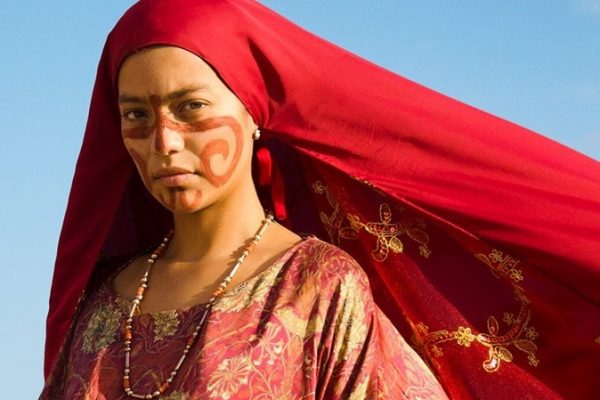Cristina Gallego, Ciro Guerra/ Colombia Denmark Mexico Germany/ 2018/ 125 mins
@Filmhouse, Edinburgh from Fri 17 May 2019
“Dreams are the proof that the soul exists,” says one of the village elders near the beginning of Cristina Gallego and Ciro Guerra’s epic gangster drama. Birds of Passage focusses on the marijuana trade in Northern Colombia from the late 60s to the early 80s, and the catastrophic impact it has on two families of the Wayuu people of the Guajira Peninsula. It’s a straightforward tale of criminal rise and fall like The Godfather and Scarface, but given extra thematic spice by the cultural milieu in which it takes place. This gives an already riveting story the sense of being something more original than it actually is as the traditional culture depicted is eroded by toxic Western capitalism. All of the familiar tropes are in place for sure, but there is a brutal beauty in its presentation.
Rapayet (José Acosta), a Wayuu man who has recently returned to the tribe, falls for local beauty Zaida (Natalia Reyes) despite the misgivings of Zaida’s mother, the indomitable village matriarch Ursula (Carmiña Martínez). To fund an exorbitant dowry he makes a deal with another Wayuu family to supply weed to a visiting American Peace Corps. This business goes from strength-to-strength until greed and violence kick off an internecine war between the two families.
Birds of Passage is more straight-forward and genre-inflected than Guerra’s previous film, the 2015 colonial nightmare Embrace of the Serpent, though both share a fascination with the collision of cultures. Interestingly, although the conflict that escalates between the families provides the action, the real struggle is between Rapayet and Ursula. She disapproves of the man her daughter married and the way that he is often at odds with the customs of the Wayuu. However, her hard-line resistance is compromised by the status and prosperity that the money affords. It isn’t long before guns and ammo are being hidden in sacred graveyards, and an incongruous Le Corbousian modernist folly is built in the middle of the desert. Rapayet’s love for his family and his instinctive squeamishness clash with the demands of a violent industry; not least when he has to deal with a psychotic loose-cannon partner (Jhon Narváez) who becomes a catalyst for local tensions. This, as foreshadowed by the village elder early in the film, as the real battle of souls, and the dreams inevitably cease.
For all its astounding visual sense and the Shakespearean level of tragedy it achieves, Birds of Passage is slightly let down by some lazy writing that relies on two hot-headed characters to trigger conflict. It also suffers from Zaida’s relegation to the fringes of the story. She should have been a fascinating fulcrum, bridging the old culture and the new capitalism. Instead, by the end, she exists as a figure of poetic punishment for her feuding family.
Birds of Passage is still a magnificent achievement, with moments of surprising delicacy, not least through the striking surrealism of its dream sequences, and its refusal to descend into the easy extremity that is a staple of the crime genre. Depictions of violent acts are rare in the film, the camera often tactfully cutting away, but the effects of the violence are always felt. In the background, there is always the knowledge of what the marijuana trade became. The rise of Escobar and the cartels were still to come, and thousands of lives were yet to be swallowed up. In this sense, marijuana really was a gateway drug.
